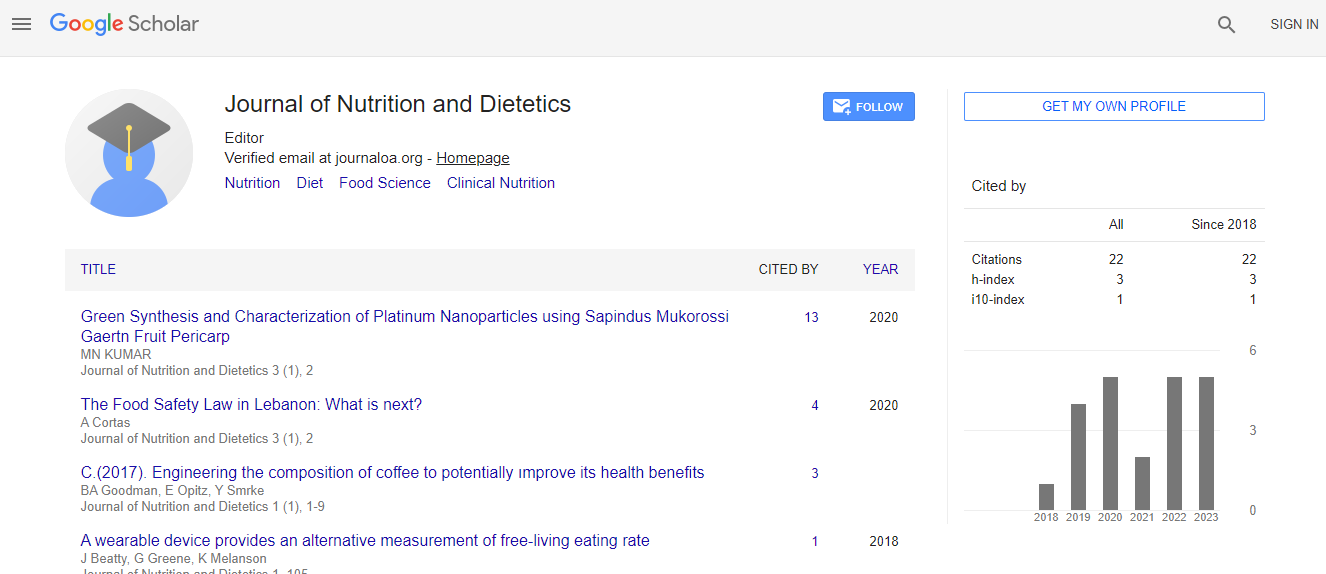Nutrition education improves knowledge scores on dietary management, physical activity and index among Type 2 diabetes mellitus patients in a Randomized control trial
*Corresponding Author:Received Date: Aug 02, 2021 / Accepted Date: Aug 22, 2022 / Published Date: Aug 29, 2022
Copyright: © 2022 . This is an open-access article distributed under the terms of the Creative Commons Attribution License, which permits unrestricted use, distribution, and reproduction in any medium, provided the original author and source are credited.
Abstract
Type 2 diabetes mellitus (T2DM) is on the increase hence the need for preventive strategies to curb this upward trajectory.
Diabetes education is one of the preventive strategies that can be adapted and employed with the aim of increasing knowledge
and awareness of overall management of T2DM Therefore, the aim of this study was to determine the effect nutrition education on
knowledge level in Type 2 diabetes mellitus patients. The study was a randomized control trial with two intervention groups; nutrition
education peer to peer support (NEP) group and nutrition education (NE) group, and a control (C) group. One of the intervention
group received nutrition education programme. The NEP group received nutrition education programme with additional peer to
peer support component while NE group received only nutrition education. The nutrition education classes run for eight weeks 2
hrs. each. Standard care was given to the control group. A pre-test questionnaire testing knowledge on diabetes management (5
questions), diet management (10 questions), glycemic index (10 questions) and physical activity (5 questions) was administered
to all the groups before the intervention and the same questionnaire was administered after the intervention, at month one,
month three and month six. Mean percentage knowledge score was determined and compared between groups using Analysis
of co-variance (ANCOVA). The results showed that there were no statistically significant differences in the knowledge score of
the participants at baseline in all the groups. However knowledge scores improved significantly (p<0.01) post intervention in the
NEP; +42.45% after intervention, +40.00% at month one, +34.53% at month three and +36.68% at month six post intervention
after intervention, , and. The knowledge score also improved in NE; +38.34% after intervention, +35.37% at month one, +31.12%
at month three and +33.10% at month six post intervention. The greatest improvement was seen one month after the intervention
in the two intervention groups. When we compared the knowledge score differences between the groups, there was a statistically
significant (p<0.05) difference between NEP and NE at month one (4.33%,) and at month six (3.59%,) post intervention and
between NEP and C (37.99%, 35.13%, 29.04% and 32.57%; p<0.01) and NE and C ( 34.16%, 30.80%, 25.91% and 28.98%;
p<0.01) after intervention and at month one, month three and month six post intervention, respectively. In conclusion, our findings
show that the application of nutrition education programme in Type 2 diabetes mellitus patient improved the knowledge score in
diabetes management, diet management, physical activity and knowledge on glycemic index. Furthermore, the inclusion of peer
to peer support improved the outcome; hence we recommend that nutrition education programme with peer to peer support can
be adapted as a preventive strategy for type diabetes mellitus patients.

 Spanish
Spanish  Chinese
Chinese  Russian
Russian  German
German  French
French  Japanese
Japanese  Portuguese
Portuguese  Hindi
Hindi 